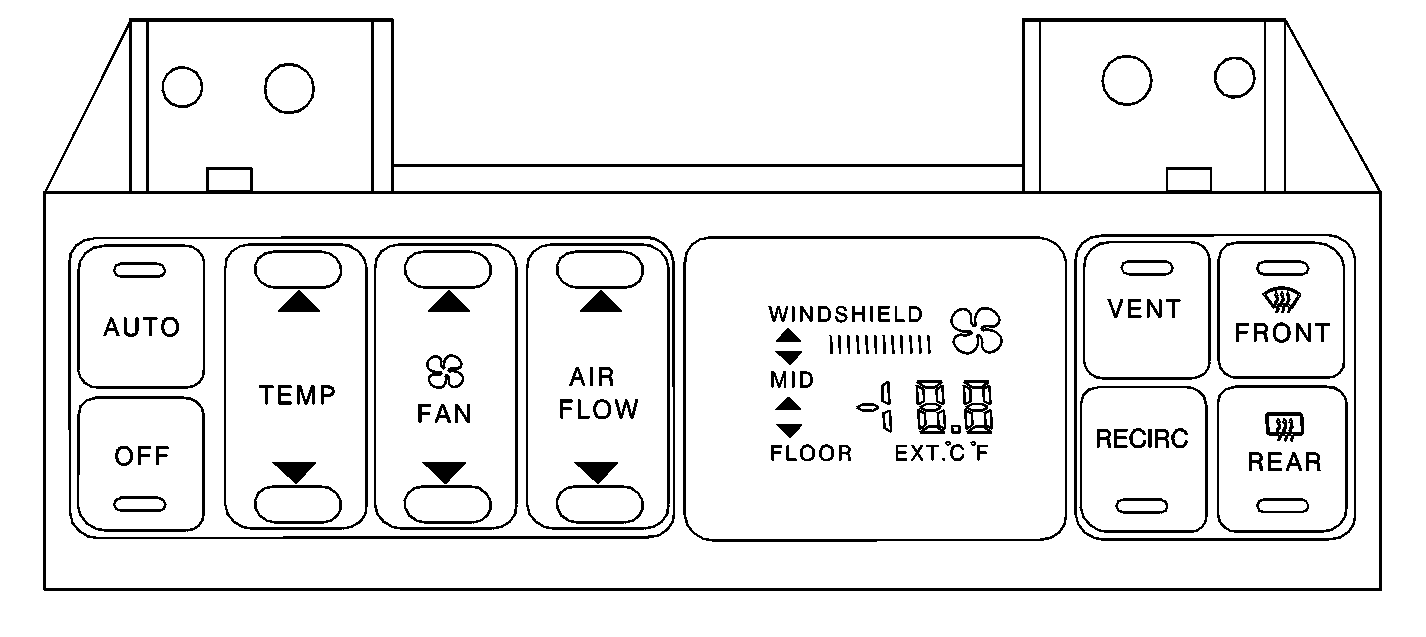Heater and A/C Control Assembly

The heater and A/C control
allows the vehicle operator to communicate with the electronic A/C system.
The heater and A/C control includes the following features:
| • | Soft touch buttons to select operating modes |
| • | A vacuum florescent (VF) information display panel |
Each operating mode button (except OFF) contains an LED indicator that
illuminates when the operator selects that mode. The rear window defogger
also has an LED indicator.
The heater and A/C control assembly includes a vacuum-fluorescent display.
Temperature Button
The temperature control performs the following functions:
| • | When the system is in the OFF mode, the system turns ON in the
AUTO mode when the occupant of the vehicle presses temperature UP or DOWN
button. |
| • | When the system is in any mode except OFF, either button performs
one of the following actions: |
| - | If the temperature is 19°-29°C (66°-84°F),
pressing WARM/COOL buttons increases/decreases the internal temperature setting
by 1°. |
| - | If the temperature is 18°C (65°F), pressing the
COOL button decreases the internal temperature setting to 16°C (60°F). |
| - | If the temperature is 30°C (85°F), pressing the
WARM button increases the internal temperature setting to 32°C (90°F). |
A change is the temperature setting signals the heater and A/C programmer
to bring the passenger compartment temperature to the new setting. This is
done by changing the following items:
| • | The air discharge location |
| • | The air discharge temperature |
Fan Speed
Use the fan speed button in order to manually change the fan speed in
the following manner:
| • | Pressing the fan speed button once increases/decreases the fan
speed by 1 level. |
| • | Holding the fan speed button will increase/decrease the fan speed
to the maximum speed. |
If the system is operating under AUTO fan speed control, pressing the
stops the AUTO fan speed control and begins a manual fan speed control.
The fan speed remains constant, unless the driver presses one of the
speed control buttons again.
When the system is in OFF mode, pressing the AUTO button causes the
system to turn on AUTO mode with AUTO fan speed control.
Mode Selector Buttons
The heater and A/C control has a mode selector button for each of the
following operating modes:
If the driver presses AUTO, the following actions occur:
| • | The heater and A/C programmer tests the internal temperature selected
by the operator and the information provided by the system's network of sensors. |
| • | The heater and A/C programmer then initiates the appropriate air
intake point, air discharge points and activates/deactivates the A/C compressor |
AIR FLOW
Use the AIR FLOW button in order to change the air flow direction in
the vehicle. Selection of the AIR FLOW button when in AUTO mode will lock
in the air flow direction that AUTO was controlling. Pressing the
AIR FLOW button also activates the VF display for the direction selected.
If an air flow direction is currently displayed, pressing the AIR
FLOW button selects the next air flow direction, either up or down
depending on operator selection. The air flow direction will sequence
upward through the following modes:
- FLOOR
- FLOOR/MID
- MID
- WINDSHIELD/FLOOR
The downward sequence is the reverse of the upward sequence. These are
the only air flow direction s available through the AIR FLOW button.
VENT
When the driver presses the VENT button, the VENT LED illuminates and
the system requests that the A/C compressor be turned OFF.
| • | The VENT LED illuminates. |
| • | The system will request that the A/C compressor to be turned off. |
The driver may not activate both VENT and RECIRC at the same time.
The VENT button has no effect on the system when the FRONT DEFROST mode
is selected.
RECIRC (Recirculate)
The main function of the RECIRC button is to limit the amount of outside
air that is brought into the vehicle by activating the air inlet valve. When
the driver presses the RECIRC button, the RECIRC LED illuminates and
the system closes the recirculate door.
| • | The RECIRC LED illuminates. |
| • | The system will close the recirculate door. |
The driver may not activate both VENT and RECIRC at the same time.
The RECIRC button has no effect on the system when the FRONT DEFROST
mode is selected.
RECIRC operates for approximately 10 minutes before deactivation.
The driver may also deactivate the RECIRC function by changing to a manual
mode.
FRONT DEFROST
When the driver pressed the FRONT DEFROST button, the FRONT DEFROST
LED illuminates and the current temperature setting displays for 5 seconds.
The FRONT DEFROST directs air to the windshield. FRONT DEFROST is a
manual mode only.
Vacuum Fluorescent (VF) Information Display Panel
The vacuum fluorescent (VF) panel provides system operating information
for the driver. A 3-digit temperature readout is located near the center of
the display. With the system in OFF mode, the outside temperature
is displayed continuously.
The driver may display the current temperature setting by selecting
any mode except OFF or adjusting the temperature control.
The current temperature setting displays for 5 seconds. The display
then returns to the outside temperature.
Symbols
The following arrows appearing in the center of the display indicate
the air discharge location relative to the seat:
| • | An upper (windshield) discharge arrow |
| • | A lower (floor level) discharge arrow |
| • | A middle (instrument panel) discharge arrow |
Either one or a combination of these discharge arrows may be illuminated,
depending on the current system operating mode. If the system is turned OFF,
the area is blank and the display returns to the outside temperature
reading.
The driver may display the current temperature setting by selecting
any mode except OFF or adjusting the temperature control.

